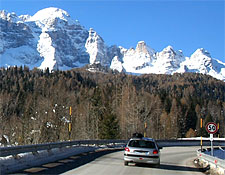Rental Car Tool Kit

Whether you've already decided to rent a car or you're weighing the pros and cons, our guide to car rentals is meant to serve as a first stop, a place where your most pressing questions can be answered.
Think of the following as our very own Cheapo toolkit.
Pros and Cons of Renting a Car
Renting a car in Europe could mean cruising ahead through your dream vacation, or being weighed down be four flat tires. Whether or not it makes sense to rent a car has everything to do with the kind of vacation you're planning.
Pro Scenario
For getting off the beaten path, into mountain ranges, and into the countryside far from airports, train grids, and bus networks, renting a car is the way to go. In fact, it may well be your only option. For countryside journeys, car rentals mean freedom and mobility. They mean that the mountaintop itinerary and the obscure hidden village are reachable. Con Scenario
For city-based holidays, car rentals are usually a bad idea. For those coming from outside of Europe, the sheer density of public transportation options, both within and between cities, means that a car rental is not necessarily the best option. Indeed, in some circumstances, a car rental is a downright poor option. Factor in extortionate car parking costs, the difficulty and hassle of parking, and the fact that most places you'll want to visit are easily accessible via public transportation, and the appeal of a car rental quickly fades.
In sum
A city break is just about the worst kind of setting for a car rental; a back country or cross-country journey is just about the best.
Making a Decision
The decision to rent a car could save you money -- or bring you extra expenses and hassles. Choose wisely, Cheapo! Evaluate equivalent train, air, and bus fares against car rental quotes from a trusted consolidator service. If keeping things cheap is your highest priority, then pay especially close attention to which mode of transportation will keep things inexpensive.
Who Can Rent?
Generally, those over 21 can rent cars in Europe, although the minimum rental age in some cases is as high as 23. Additionally, we have seen surcharges placed on drivers under 25. Under-21s are typically not able to rent cars in Europe.
At the other end of the spectrum, drivers over the age of 75 may not be permitted to rent cars in certain countries, including Ireland.
International Driving Permits (IDPs)
If you come from outside of Europe, it is a good idea to obtain an International Drivers Permit (IDP). An IDP is essentially a vesion of your national driving license reformatted to an international standard. Police in many European countries can (and will) demand to see your IDP.
IDPs can be purchased through national automobile associations. Here is a list of country-specific automobile associations.
Border Crossings
Always make your intentions clear when you book your rental car. If you intend to pick up a car in a western European country and drop it off in an Eastern European one, beware. Insurance rates spike for some countries, especially those where the fear of car theft is particularly high. Additionally, those who get into accidents in countries where their insurance or Collision Damage Waiver is not valid will discover just how unpleasantly expensive car damage can become.
Insurance rates are so high for travel within Eastern Europe in part because certain countries (like the Czech Republic) are strongly associated with car theft.
Calculating Costs
Taxes will come in as high as 25 percent on top of the daily rate. The most helpful car rental sites will issue an all-inclusive rate that includes taxes, and will thus help customers avoid last-minute teeth-gnashing frustrations.
A Collision Damage Waiver (CDW) will add another 25 percent to your daily rate. Auto Europe rather helpfully includes the CDW cost in its quotes.
Gas/petrol is not cheap in Europe. Budget €120 for a week's worth of fuel for long-distance car travel.
Parking in big cities can cost as much as €25 per day. Keep in mind that smaller towns and rural locations in general will be more budget-friendly as far as parking is concerned.
Drop-off costs are a potentially huge additional expense. They can add hundreds of euros on to your final tally. Always clarify drop-off costs in advance, and measure them against daily rates to make sure you're getting the best deal possible. Note also that airport drop-offs and pick-ups may incur a surcharge.
Tolls are another expense, more or less unavoidable in France and Italy. Only rarely will toll costs exceed €10 per day.
Note that Switzerland requires the purchase of a drivers permit sticker, or vignette. A vignette costs CHF40 (€24; $35) and is valid for a calendar year plus the previous December and the following January.


